Bournemouth U’s Sascha Dov Bachmann (EBC) and Prof Joachim Sanden (Germany, Luneburg) presented a paper on National Security and Public Health at the IALS – SAS in London (http://events.sas.ac.uk/events/view/15689). Their topic “The Right to Liberty and Security, Public Health and Disease Control”uses the examples of the Escherichia coli (E. coli O157) outbreak in Surrey in August 2009 and the EHEC-O104:H4 outbreak 2011 in Germany by Fenugreek Sprouting seeds, to discusses potential human rights implications of food safety hazards across the food chain (see the European crisis management according to Art. 10 of EC regulation 178/2002 and the U.K. Public Health (Control of Disease) Act 1984, the Public Health (Infectious Disease) Regulations 1988 and the Food Safety Act 1990). Both authors also touched upon potential legal vacuums and loopholes around public and civil safety and security when dealing with new health and environmental threats such as Avian or Swine influenza (flu), which can lead – especially if used as a potential means of bioterrorism – to a national health and security crisis and even mutate into an international pandemic. Consequently, any emergency responses by a state can also directly affect human rights.
Category / EU
Welcome to the EU section of the blog! Emily Cieciura (BU’s Research Facilitator – EU and International), Jo Garrad (Funding Development Manager) and Dianne Goodman (Funding Development Co-ordinator) together try to take the pain out of finding and applying for EU funding by horizon scanning many sources and placing the most important information on this page.
We blog as often as possible on everything from calls for proposals and partner searches, to networking event opportunities, all the latest on Horizon 2020 and international funding. We also use the blog to disseminate information on EUADS (BU’s EU academic training initiative), how to write brilliant proposals, how to find partners and other top tips!
Sustentabilidade nas Universidades; Reflections on ERASMUS mobility – a personal and professional development opportunity
I have just returned from an ERASMUS training visit (to share and develop approaches for sustainable development) at the University of Beira Interior (UBI), Covilhã, Portugal. Such a rewarding experience!
Located on the slopes of Serra da Estrela, Covilhã looks out on a fertile valley, framed by mountains – a beautiful location, largely unfamiliar to people from the UK.
The city was once regarded as the ‘Portuguese Manchester’ for its long tradition in the wool industry and textile production, however like other textile towns production ceased, people moved away, and the social and economic consequences for the region were immense.
The University has brought new life to the area and is working towards enhancing the sustainability of the region. One of the most interesting characteristics of UBI is its focus on recovering the abandoned buildings that were formally part of the industrial production process and creating a better environment; retaining historical, cultural and architectural value, while developing sustainable educational facilities has been an important goal.
During my trip I had the opportunity to visit the various sites, give presentations and meet with colleagues. The University has five Faculties (Science, Engineering, Human & Social Sciences, Arts & Letters, and Health Sciences).
Particularly interesting was the tour of the University Wool Museum which is integrated into the science building, and reveals the archaeological structures of the early production process, sets out the historical development of technology, and provides insights on industrialisation. I came away from the tour, thinking of the various ways that this facility could be used to enhance learning for students on any course, not just those interested in science and technology. The motto of the museum “The Threads of the past weaving the future” left me thinking that when we focus on sustainable development, we often emphasise ‘future generations’ but we must also acknowledge and learn from the past.
My visit to the Rectory (housed in the former Convent of Santo António and their equivalent of OVC) also left me thinking. Firstly, they have made a fantastic job of restoration and conversion; they really could do with some students (as motivated as BU students) to reclaim the lovely terraces. Olive and fruit trees are largely over-grown; the space cries out to be developed as a sustainable garden. Secondly, they have made great use of space in the former chapel, however where the choir would formerly have sat, is now where doctoral candidates are judged – the jury type seating made it seem a really intimidating space compared to a room in Christchurch House, to defend a Thesis. And lastly, if I was a member of the senior team in such an idyllic spot, I would probably not be able to resist the urge to get out a hoe and create a vegetable plot – however the urge to just sit in the sun and admire the view, would also be strong!
It is always interesting to meet new colleagues, learn from their perspectives, and to talk with students. The students I presented to during my visit (on Sustentabilidade nas Universidades) were very impressed with what we are doing in the UK, and at BU, to address sustainability. They had lots of questions; later their tutor reported that not only were they were interested to know more but were also challenging her as to why BU students seemed to have a better experience. Some were very keen to come to Bournemouth.
Overall, I came away feeling enriched and with new perspectives. I would recommend an ERASMUS visit to others. Okay the paperwork can seem bureaucratic at first glance but don’t be put off, the rewards are high. I have published four co-authored papers as a result of my first ERASMUS visit; more collaborative outputs will follow. Further, the opportunity to develop broader cultural perspectives on research interests, enhance your language capability and to evaluate how higher education operates in another country is personally and professionally rewarding.
If you would like to make contacts at UBI please get in touch. I would be happy to help.
Media School Academics Join EU CyberPark Project
![]() The EU COST funded CyberPark project brings together participants from 21 countries to explore how ICT can help attract more users to engage with public spaces more efficiently, enhancing their health and wellbeing. With the emergence of social media, wearable technologies and devices such as Google Glass, a future where technology is embedded in the environment and where landscapes respond to the people who pass through them may no longer be just science fiction fantasy. The CyberPark project will explore how nature and the digital can be brought closer together, drawing on the expertise of urban planners, architects, anthropologists and researchers from the arts and humanities.
The EU COST funded CyberPark project brings together participants from 21 countries to explore how ICT can help attract more users to engage with public spaces more efficiently, enhancing their health and wellbeing. With the emergence of social media, wearable technologies and devices such as Google Glass, a future where technology is embedded in the environment and where landscapes respond to the people who pass through them may no longer be just science fiction fantasy. The CyberPark project will explore how nature and the digital can be brought closer together, drawing on the expertise of urban planners, architects, anthropologists and researchers from the arts and humanities.
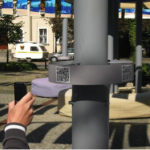
Bronwen Thomas, Sue Thomas and Sam Goodman from the Media School’s Centre for the Study of Journalism, Culture and Community will all be contributing to the four-year project from May 2014. Bronwen Thomas is Director of the Centre and an Associate Professor in the Media School. She has published widely on new media narratives and organized the Location-based Storytelling symposium here at BU in 2012. Sue Thomas is a Visiting Fellow in the Media School, and recently published a book on Technobiophilia (Bloomsbury, 2013) exploring the relationship between nature and cyberspace. She is currently developing ideas around digital well-being. Sam Goodman is Lecturer in Linguistics in the Media School, with research interests in Medical Humanities and literary representations of space, place and landscape.
You can read more about the project on Sue Thomas’s new Wired Well-being column for The Conversation at https://theconversation.com/cyberparks-will-be-intelligent-spaces-embedded-with-sensors-and-computers-26837
Full details of the COST action can be found at
http://www.cost.eu/domains_actions/tud/Actions/TU1306
Be in the loop on European funding – sign up to the UKRO Portal today!
 As BU subscribes to UKRO you are entitled to a number of services, including your own personalised profile on the UKRO Portal.
As BU subscribes to UKRO you are entitled to a number of services, including your own personalised profile on the UKRO Portal.
Via the Portal, UKRO disseminates information on EU funding programmes for research and innovation, most importantly on Horizon 2020, the EU’s largest funding programme for research and innovation of the European Union, worth EUR 70,2 billion.
Who can sign up?
Whether you are a researcher, European liaison officer or research manager/administrator – you can sign up for free to stay up to date with the latest news, opportunities and insight in European funding.
What does the Portal cover?
The UKRO Portal provides regular updates and daily news on EU funding programmes, with a particular focus on Horizon 2020. The Portal also provides information on other European funding programmes and has a dedicated EU policy section.
When signing up, you can tailor your profile to meet your specific needs, by selecting research and policy areas of interest and by determining the frequency of email updates.
Why sign up now?
Horizon 2020 started at the beginning of this year and the first set of calls has been launched. UKRO keeps you up to date on the latest Horizon 2020 developments, including on the work programme development, the likely timetable for future calls, application, proposal writing and project implementation advice, information on networking and brokerage events, information days, partner searches and relevant related policy developments.
How do I sign up?
Signing up only takes a few minutes:
New users from organisations that subscribe to UKRO can set up a profile on the UKRO Portal by going to http://www.ukro.ac.uk. There is a Quick Registration option or the option to tailor your profile according to specific areas of interest.
EU news this week: What funding could you apply for?
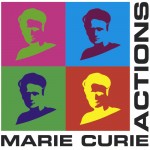 Struggling to stay up to date with all the latest on European funding? Then read on for this handy summary of some of the latest resources available….
Struggling to stay up to date with all the latest on European funding? Then read on for this handy summary of some of the latest resources available….
- Missed the Horizon 2020 information day in London? Then visit the ESRC website for a raft of presentations!
- Thinking about the Marie Sklodowska-Curie fellowships? Act now for the best chance of success! The next deadline is in September. Call details are on the EC website and for further support, please contact Becca Edwards
- What does the EC want to see for its 70.2 billion euros? Get some insights from the update on the progress of the Europe 2020 policy.
- UKRO is running an information session on the Marie Sklodowska-Curie COFUND call. For further details, please click here. The session will take place between 10.3oam-4pm in London. Further details about the COFUND call can be found on the European Commission website. The EC says: “Transnational mobility opens up new horizons for researchers. To encourage their movement across borders, Marie Curie Actions offer additional funding to existing or new regional and national fellowship programmes for research training and career development. This COFUND scheme can also support and strengthen existing and new international programmes”.
- URKO annual conference. Book now! 26th/27th June in Bristol. They say: “Each year the UK Research Office (UKRO) organises a two-day Annual Conference aimed predominantly at European Liaison Officers, European research managers, Research Councils and policy makers. The conference provides an excellent forum for discussion and networking with key speakers from the European Commission on a range of EU policies and funding opportunities. 2014 is an important year for research organisations as everyone adapts to the changes brought about by Horizon 2020, Erasmus Plus and other new programmes. Furthermore, this year, UKRO is celebrating its 30th Anniversary and a special edition of the Annual Conference will be held on Thursday 26 and Friday 27 June in Bristol”.
- What to know what the Horizon 2020 evaluators are looking for? Email Becca Edwards for the latest inside view.
- Finding the online systems of Horizon 2020 a struggle? Then participate in this survey to make it better!
- Working conditions and career development to be included in the H2020 grant agreement. Further details available from Vitae.
- Interreg V:Launch of the public consultations. Further details on the Interreg V website
As ever, if you are looking for further support to develop your EU funding proposal, please do not hesitate to contact Paul Lynch or Rebecca Edwards in R&KEO.
What does Horizon 2020 mean to you? Check out these resources to learn more!
 Many colleagues that I speak to feel that Horizon 2020 is not something for them, when in-fact the share of the 70.2 billion euros could be a key area of research funding.
Many colleagues that I speak to feel that Horizon 2020 is not something for them, when in-fact the share of the 70.2 billion euros could be a key area of research funding.
But how do you get started? As Horizon 2020 gathers momentum, more information is becoming available to help support your proposal development.
Check out this new publication: Horizon 2020 in brief for a great no-nonsense introduction. Another factsheet has been produced by Enterprise Europe Network and is also well worth a read.
And don’t forget, you can watch the Horizon 2020 UK launch via this webinar.
Last chance to sign-up for a Horizon 2020 Information Day in London – registration closes Friday 21st March
 Next week, there is a Horizon 2020 Information Day being held in London organised by the UK National Contact points. Further details are below. If you can’t make it, don’t worry, Rebecca Edwards will be there and feedback the relevant information.
Next week, there is a Horizon 2020 Information Day being held in London organised by the UK National Contact points. Further details are below. If you can’t make it, don’t worry, Rebecca Edwards will be there and feedback the relevant information.
Date:28 March, 9.30-13.30
UK National Contact Points
A cross disciplinary Programme for the academic community
This information day is part of a series of events organised by RCUK national contact points. They are for organisations interested in exploring funding opportunities in key areas of the new European Horizon 2020 research and innovation programme (2014-2020) launched on 11 December 2013.
Programme
- 9.30-9.45 – Registration
- 9.45-10.00 – Introduction on H2020
- 10.00-10.20 – Legal and financial Issues
- 10.20-10.30 – An evaluators perspective
- 10.30-10.50 – Research infrastructures (including e-infrastructures)
- 10.50-11.05 – FP7 success story: research infrastructures programme
- 11.05-11.20 – Coffee break
- 11.20-11.45 – Societal challenge 1: health, demographic change and wellbeing
- 11.45-12.15 – Europe in a changing world: Inclusive, innovative and reflective societies and social sciences and humanities embedded across H2020
- 12.15-12.40 – Science with and for society
- 12.40-13.30 – Drop in sessions with one of the national contact points for questions and specific advice not covered during the main session
There is no charge for the event but registration is necessary in order to participate. Registration closes 21 March 2014 or before if maximum capacity is reached.
LAST REMINDER – Don’t Miss Out… Still Some Space on the Marie Curie and Horizon 2020 Lunchtime Info Sessions?
Just curious or planning to put in an application to the Marie Curie scheme – don’t miss out….. pick a lunchtime session and get yourself booked in NOW via staff development – first session tomorrow!! Click on the links below or send them a quick email with the details of the session(s) you would like to attend
To learn more about the Marie Skłodowska Curie calls, please book NOW via staff development:
- Thursday 20th March, 12noon-2pm on Lansdowne Campus,
- Wednesday 26th March, 12noon-2pm on Talbot Campus
Thinking about other EU schemes? To learn more about Horizon 2020 as a whole, please book NOW via staff development:
If you are already developing a Marie Skłodowska Curie proposal and would like a one-to-one Dr Martin Pickard after one of the information sessions, please contact me Dianne Goodman. I only have the following 3 appointment slots left on the 20th of March at the Lansdowne Campus:
1000 – 10:45am, 14:30 – 15:15pm or 15:15 – 16:00pm
Remember the Marie Curie calls under FP7? Well, they are new and improved under Horizon 2020 and have been renamed and revised…
Dr Martin Pickard, the trainer says: “The new Marie Skłodowska Curie schemes within Horizon 2020 have considerable relaxed rules enabling even greater opportunities for participation; from individual research fellowships to medium term collaboration exchange. Presenting Horizon 2020 Marie Skłodowska Curie as a whole, the workshop also focuses on the opportunities for individual fellowships to highlight these opportunities and presents how to approach them to ensure a maximum chance of success (typically better than 1 in 3)”.
And don’t forget that BRAD offers a range of additional training opportunities which are very helpful to developing proposals for EU funding. These include:
- Research Bid Writing Workshop, Talbot Campus, Talbot Campus, 26th March, 9-11:30am
- Networking and Collaboration Opportunities, Talbot Campus, 2nd April, 2.30-4:30pm
Why not come along to all the available training sessions and boost your chances of being successfully funded by the European Union?
An EU Masters in Dementia
Positive  about Dementia is an EU multi-lateral project to develop an inter-disciplinary Masters programme to educate and develop an effective and informed dementia workforce. It was launched in September 2013 and is funded by the EU Lifelong Learning programme. The Positive about Dementia Masters programme will take a positive and appreciative view of the life experience of people living with dementia. The curriculum will contain modules that will explore dementia awareness, evidence-based practice,and research to inform how we can support the wellbeing of people with dementia through educating dementia professionals. The BU team (involving colleagues from SciTech, the Business School, HSC and BUDI) hosted the kick off meeting back in December and following our next team meeting in Dublin in February we are moving full steam ahead with partners in all countries currently conducting consultations with a range of local stakeholders including service commissioners and providers as well as people with dementia and their carers about their views on what the curriculum should cover. A website has been created which will document our development activities over the next 2 and 1/2 years www.posadem.eu. In due course we will be looking for students to pilot the modules we create. If you have a view about what the curriculum should look like or if you know someone who may be interested in being one of our pilot group students do get in touch.
about Dementia is an EU multi-lateral project to develop an inter-disciplinary Masters programme to educate and develop an effective and informed dementia workforce. It was launched in September 2013 and is funded by the EU Lifelong Learning programme. The Positive about Dementia Masters programme will take a positive and appreciative view of the life experience of people living with dementia. The curriculum will contain modules that will explore dementia awareness, evidence-based practice,and research to inform how we can support the wellbeing of people with dementia through educating dementia professionals. The BU team (involving colleagues from SciTech, the Business School, HSC and BUDI) hosted the kick off meeting back in December and following our next team meeting in Dublin in February we are moving full steam ahead with partners in all countries currently conducting consultations with a range of local stakeholders including service commissioners and providers as well as people with dementia and their carers about their views on what the curriculum should cover. A website has been created which will document our development activities over the next 2 and 1/2 years www.posadem.eu. In due course we will be looking for students to pilot the modules we create. If you have a view about what the curriculum should look like or if you know someone who may be interested in being one of our pilot group students do get in touch.
Fusion funding supports Brussels trip to find out what EU does for you
As a result of a successful Fusion fund bid, 34 students drawn from across Bournemouth University’s Media and Business Schools will go on a five-day fact finding trip to Brussels between 17th-21st March. The trip is part of a project around engaging the public in the 2014 European Parliamentary Elections. The students, who will be accompanied by Dr. David McQueen and Dr. Dan Jackson (Media School), will be gathering data and producing a range of media reports (interviews, features, blogs, photographs, profiles and backgrounders) which will feed into Media School coverage of EU election night on 22nd May. The itinerary includes a meeting with MEPs Ashley Fox and Julie Girling organised by Douglas Tham (Politics Society President and Politics and Media second-year student), tours of the Council of the EU, the Parlamentarium, the European Commission and the Palais de Justice.
The Fusion project links to the research theme Communities, Cultures and Conflicts. In particular, it links into work within the Media School on governance and exploring ways of deepening democracy through developments in political communication and in the production and consumption of news. Research outputs will include qualitative data on young people’s attitudes to the EU elections in Britain, but also in other EU nations. Students will be reflecting on opportunities and barriers to engaging young people in EU political affairs and considering the particular challenges media professionals face in covering the election against a backdrop of political disengagement, the rise of UKIP and increasing euro-scepticism. As a recent Eurobarometer survey (2012) demonstrated only 27% of Britons were very or fairly attached to the EU, last by a significant margin out of all member states. The survey also revealed Britons to be amongst the most uninformed citizens of all member states about EU matters, thus raising democratic concerns about the public’s potential for manipulation, and the democratic legitimacy of elected representatives with turnout at the last EU Parliamentary Elections in the UK at just 34.7%.
This multidisciplinary project will embrace staff-student co-creation to produce research and media outputs that will inform and engage students and the local public in the 2014 EU Parliamentary Elections. Alongside the many benefits for participating BU students and staff, the project will strengthen links between Bournemouth University and local and regional political parties, media organisations, as well as EU political and educational institutions in Brussels and beyond.
The students who will attend represent programmes across the Media School including Politics and Media, TV Production, Journalism, Radio Production, Animation, Post Production Editing the Business School’s Law degree,
More details on the Brussels trip and the election night coverage will follow in future posts.
David McQueen
(Programme Leader: BA Politics and Media)
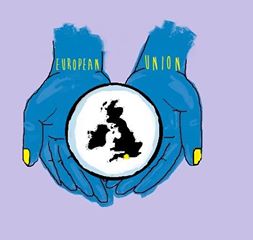
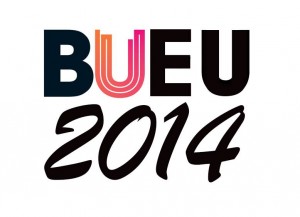
REMINDER – Book Now! Marie Skłodowska Curie and Horizon 2020 Lunchtime Info sessions?

Marie Curie Lunchtime sessions:
20th of March at Lansdowne Campus 12-2pm
26th of March at Talbot Campus 12-2pm
Horizon 2020 session:
2nd of April at Talbot Campus 12-2pm
Remember the Marie Curie calls under FP7? Well, they are new and improved under Horizon 2020 and have been renamed and revised…
Dr Martin Pickard, the trainer says: “The new Marie Skłodowska Curie schemes within Horizon 2020 have considerable relaxed rules enabling even greater opportunities for participation; from individual research fellowships to medium term collaboration exchange. Presenting Horizon 2020 Marie Skłodowska Curie as a whole, the workshop also focuses on the opportunities for individual fellowships to highlight these opportunities and presents how to approach them to ensure a maximum chance of success (typically better than 1 in 3)”.
To learn more about the Marie Skłodowska Curie calls, please book NOW via staff development:
- Thursday 20th March, 12noon-2pm on Lansdowne Campus,
- Wednesday 26th March, 12noon-2pm on Talbot Campus
If you are already developing a Marie Skłodowska Curie proposal and would like a one-to-one Dr Martin Pickard after one of the information sessions, please contact Dianne Goodman.
Thinking about other EU schemes? To learn more about Horizon 2020 as a whole, please book NOW via staff development:
And don’t forget that BRAD offers a range of additional training opportunities which are very helpful to developing proposals for EU funding. These include:
- Research Bid Writing Workshop, Talbot Campus, Talbot Campus, 26th March, 9-11:30am
- Networking and Collaboration Opportunities, Talbot Campus, 2nd April, 2.30-4:30pm
Why not come along to all the available training sessions and boost your chances of being successfully funded by the European Union?
Bournemouth European Network in Cyber Security (BENICS)
In recent years, the field of Cybersecurity has attracted researchers and practitioners from academic fields ranging from Computer Science and Design, through to Psychology and Business Studies. To date, however, these communities have not been influenced by each other. Their research are disseminated in a variety of workshops and conferences across these fields. As a result, there is a misunderstanding of the role these different fields play in improving cybersecurity. For example, some researchers describe people are “the weakest link” and encourage designers to build systems that “Homer Simpson” can use safely. Unfortunately, treating users as a problem limits opportunities for innovation when people are engaged as part of a solution. Similarly, treating practitioners like cartoon characters disenfranchises the very people that a design is meant to support. Bournemouth University is one of the few institutions in the world with interests across the disciplines contributing to Cybersecurity, a small enough size for academics across these disciplines to engage with each other, and the vision necessary to fuel this engagement. To take advantage of the opportunities afforded to Bournemouth, an interdisciplinary seminar series in cybersecurity was launched in September 2013. The seminar series has attracted both staff and students from across the university, together with practitioners from local industry with interests in cybersecurity. So far, this has led to connections forming across the Faculty of Science & Technology, and the Media and Business schools. Resulting collaborations with our seminar speakers have also led to prospective KTP and Horizon 2020 proposals, and invitations to deliver guest lectures at other universities.
To build on this momentum in interdisciplinary cybersecurity activity at Bournemouth, we have created the Bournemouth European Network for Interdisciplinary Cyber Security (BENICS): a FUSION funded SMN activity. Over the coming year, BENICS will bring five invited European cybersecurity academics to Bournemouth to engage in short (one-week), focused collaborative visits. These visits will introduce invited academics to Bournemouth’s cybersecurity capabilities, allow them to share their interests with us as part of the cybersecurity seminar series, and engage in short and focused proposal building, research, or teaching resource creation activities.
Following each visit, Bournemouth and the visiting academic will engage in pump-priming activities; these will refine deliverables produced to sustain the momentum created during the visit. These deliverables will form the basis of a joint publication at an agreed international conference or journal.
Watch this space for more information about these visits, and please get in touch if you’re interested in engaging with BENICS and our cybersecurity research in general.
Workshop on Streaming Analytics Thursday 13th March 10:30.
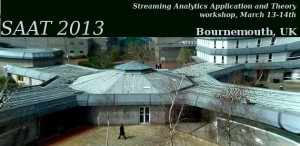
As part of a collaboration between BU and several other EU based universities and intitutions we will be hosting SAAT 2014 a workshop on the emerging area of streaming analytics. The workshop is open to all for the first day (the second day is taken up with management meetings). The focus of this workshop is on the technical aspects of how to provide streaming analytics.
Scalability and responsiveness of algorithms and architectures for large scale data streams are fundamental to harvesting the power of data generated in real-time networks. The workshop seeks to bring together industry and academic partners to explore specifically the requirements of data processing, the real-world target applications and develop from there the techniques required. The scope thus includes applications, scaling algorithms, streaming platforms, integration of streaming and batch algorithms, graph partitioning together with machine learning for streaming, concept drift and dynamic data analysis. Additional topics such as security issues and tool and platform development are of interest.
Aims:
The key aims in this workshop are several fold. Primarily we seek to identify the key issues associated real world streams of data, including key target applications. Integrated solutions, combining appropriate topics from the scope which target likely directions in this field is the end goal. Specifically, the aim of the workshop is to facilitate interaction as a crucible for consortium building in advance of Horizon 2020 (call 1.A.1.1 from the 2014-15 draft work programme.).
Organisers: Dr. Hamid Bouchachia(DEC) , Dr. Damien Fay (DEC)
Thinking about applying for one of the Marie Skłodowska Curie calls under Horizon 2020? Book now for training!
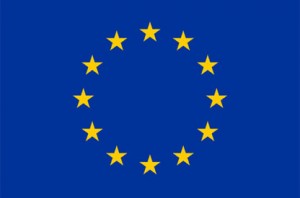 Remember the Marie Curie calls under FP7? Well, they are new and improved under Horizon 2020 and have been renamed and revised…
Remember the Marie Curie calls under FP7? Well, they are new and improved under Horizon 2020 and have been renamed and revised…
Dr Martin Pickard, the trainer says: “The new Marie Skłodowska Curie schemes within Horizon 2020 have considerable relaxed rules enabling even greater opportunities for participation; from individual research fellowships to medium term collaboration exchange. Presenting Horizon 2020 Marie Skłodowska Curie as a whole, the workshop also focuses on the opportunities for individual fellowships to highlight these opportunities and presents how to approach them to ensure a maximum chance of success (typically better than 1 in 3)”.
To learn more about the Marie Skłodowska Curie calls, please book NOW via staff development:
- Thursday 20th March, 12noon-2pm on Lansdowne Campus,
- Wednesday 26th March, 12noon-2pm on Talbot Campus
If you are already developing a Marie Skłodowska Curie proposal and would like a one-to-one Dr Martin Pickard after one of the information sessions, please contact Dianne Goodman.
Thinking about other EU schemes? To learn more about Horizon 2020 as a whole, please book NOW via staff development:
And don’t forget that BRAD offers a range of additional training opportunities which are very helpful to developing proposals for EU funding. These include:
- Research Bid Writing Workshop, Talbot Campus, Talbot Campus, 26th March, 9-11:30am
- Networking and Collaboration Opportunities, Talbot Campus, 2nd April, 2.30-4:30pm
Why not come along to all the available training sessions and boost your chances of being successfully funded by the European Union?
– See more at: http://blogs.bournemouth.ac.uk/research/?p=28698&preview=true#sthash.6Y6XdPHK.dpuf
Funding Success Stories: Sport Academic Group Strengthens Dutch-German-British Collaboration
Dr Tim Breitbarth (Sport Academic Group) has been successful with his recent bid for Fusion/EU funding for teaching exchange visits to partner institutions in Groningen, The Netherlands, and Cologne.
At German Sport University Cologne Tim – who is also Programme Leader MSc Sport Management and Coordinator Internationalisation Sport at BU – will teach at their high-profile Masters in Sport Management over four days. The Masters attracts about 200 applications per year from within and outside Germany, but only 30 students are allowed into the course. The visit to Sport’s Erasmus partner institution Hanzehogeschool Groningen will include tutoring of international groups of students who participate in a multi-day management game.
Besides teaching commitments, the trips will help to move along joint research and publication projects with his European colleagues, such as editing the Special Issue on sport and social responsibility of Corporate Governance: The International Journal of Business in Society. In addition, they have been cooperating on conference and workshop organization and will once again co-lead a track at this year’s European Association for Sport Management conference.
Also, Tim and his BU colleagues were successful in securing internal funding for the first time in order to take the Sport Management and Sport Management Golf final year cohorts to a four-day intense international student management game in Cologne in late March, which he co-organises.
Hence, collaboration with, arguably, the world’s largest and renown sport university, has been in full swing with also two BU students on study exchange in Germany in semester 2 and PhD student Emma Mosley receiving training at their specialised Institute for Sport Psychology thanks to a Santander award.

Wondering if you could access any of the €70b EU fund for research, but not sure where to start? Sign up NOW for training!
 As many readers of this blog will already know, 2014 has seen the start of a new era of EU funding through Horizon 2020, which totals a whopping €70.2 billion. BU has had some great success in receiving EU funding in recent years, so to learn more about how you could access this funding, sign up now for training.
As many readers of this blog will already know, 2014 has seen the start of a new era of EU funding through Horizon 2020, which totals a whopping €70.2 billion. BU has had some great success in receiving EU funding in recent years, so to learn more about how you could access this funding, sign up now for training.
Dr Martin Pickard, the trainer says: “The new Marie Skłodowska Curie schemes within Horizon 2020 have considerably relaxed rules enabling even greater opportunities for participation; from individual research fellowships to medium term collaboration exchange. Presenting Horizon 2020 Marie Skłodowska Curie as a whole, the workshop also focuses on the opportunities for individual fellowships to highlight these opportunities and presents how to approach them to ensure a maximum chance of success (typically better than 1 in 3)”.
To learn more about the Marie Skłodowska Curie calls, please book NOW via staff development:
- Thursday 20th March, 12noon-2pm on Lansdowne Campus,
- Wednesday 26th March, 12noon-2pm on Talbot Campus
If you are already developing a Marie Skłodowska Curie proposal and would like a one-to-one Dr Martin Pickard after one of the information sessions, please contact Dianne Goodman.
If you want to learn more about Horizon 2020 as a whole, then come along to our our session on Horizon 2020 – The New Opportunities and How to Attack Them. Our trainer says: The new Horizon 2020 programme, which will fund over €10 Billion of research each year, has started. Although, on the face of it, H2020 is similar to the previous Framework 7 programme there are, in fact, numerous significant and important differences. Understanding these differences will enable many increased opportunities and flexibility of approach to funding your research. There are thus many opportunities. This preparatory workshop introduces H2020, in the context of its remit structure and highlights these exciting new opportunities to discuss the differences in approach and strategy required to present a competitive bid and ensure success.
To learn more, please book NOW via staff development:
And don’t forget that BRAD offers a range of additional training opportunities which are very helpful to developing proposals for EU funding. These include:
- Research Bid Writing Workshop, Talbot Campus, Talbot Campus, 26th March, 9-11:30am
- Networking and Collaboration Opportunities, Talbot Campus, 2nd April, 2.30-4:30pm
Why not come along to all the available training sessions and boost your chances of being successfully funded by the European Union?
Building capacity for Sustainable Development through ERASMUS
Through the ERASMUS mobility fund, I shall be visiting the Universidade da Beira Interior in Portugal, in May this year. The purpose of the trip is to share best practice in relation to sustainable development, explore how attitudes to energy conservation and ‘green behaviours’ differ from the UK, and through collaboration, build capacity for change.
The Univeridade da Beira is located in the North of Portugal. They have undertaken quite unique projects in relation to conserving their estates – which comprise former factories and even a monastery – but they have done far less in terms of educating students for sustainable development. Previous collaboration with Portugal has resulted in a number of papers in relation to the green agenda; current work is focusing on energy and Fairtrade.
ERASMUS offers a great opportunity to develop relationships with European partners; it is also very useful for academics who wish to develop their langauge skills.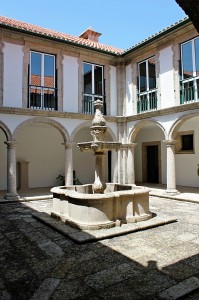
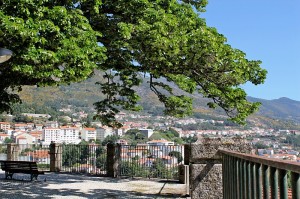
Sport PhD Student Emma Mosley To Be Trained At Top International Research Institute
Congratulations to Emma Mosley, a ST PhD student in Sport, who has been successful in gaining a substantial Santander Mobility Award. Emma will be venturing to Germany for one month in spring to research at the prestigious German Sport University Cologne within the Institute of Psychology.
Emma’s thesis, supervised by Dr Ian Jones and Dr Jo Mayoh, aims to discover the psychophysiological effects of approaching athletic competition stress in a positive manner through the use of heart rate variability (HRV).
In Germany, she will be researching under the supervision of Dr Sylvain Laborde who is an expert in the area of psychophysiology and HRV and works in a large team of internationally renowned sports psychologists.
Whilst at the University Emma will gain experience in HRV data collection, data analysis and the writing of scientific papers in relation to HRV. She will have the opportunity to join on-going research projects as well as conducting her own research.
Dr Tim Breitbarth, the Coordinator for Internationalisation of Sport at BU, said, “The visit offers Emma the chance to start engaging with leading and well-connected experts in her field while receiving first-class training in the most modern equipment at the same time. Also, her visit will help to deepen our established international research, teaching and student exchange partnerships from which BU benefits in terms of reach and reputation.”
For details about her research and international endeavour contact Emma at Emma.Mosley@bournemouth.ac.uk
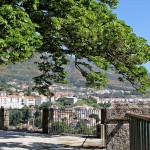
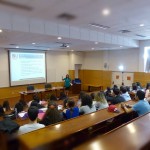
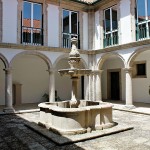

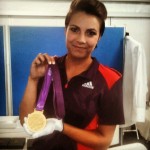
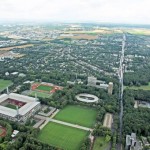












 FHSS academics teaching in Nepal
FHSS academics teaching in Nepal New weight change BU paper
New weight change BU paper One week to go! | The 16th Annual Postgraduate Research Conference
One week to go! | The 16th Annual Postgraduate Research Conference Geography and Environmental Studies academics – would you like to get more involved in preparing our next REF submission?
Geography and Environmental Studies academics – would you like to get more involved in preparing our next REF submission? Congratulations to three former BU staff
Congratulations to three former BU staff MSCA Staff Exchanges 2024 Call – internal deadline
MSCA Staff Exchanges 2024 Call – internal deadline Applications are now open for 2025 ESRC Postdoctoral Fellowships!
Applications are now open for 2025 ESRC Postdoctoral Fellowships! Horizon Europe – ERC CoG and MSCA SE webinars
Horizon Europe – ERC CoG and MSCA SE webinars MaGMap: Mass Grave Mapping
MaGMap: Mass Grave Mapping ERC grants – series of webinars
ERC grants – series of webinars